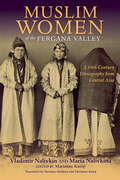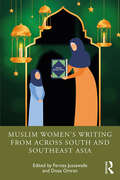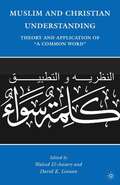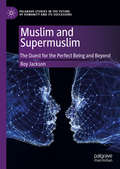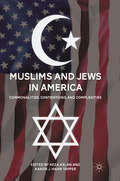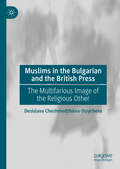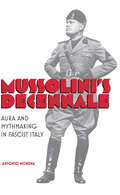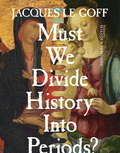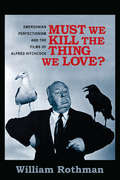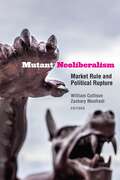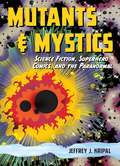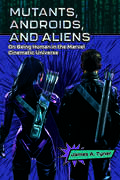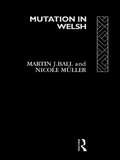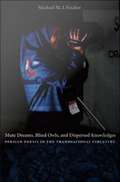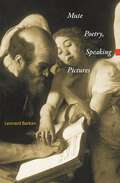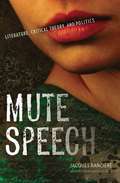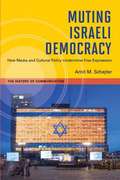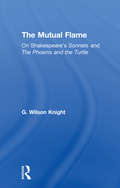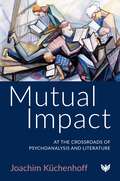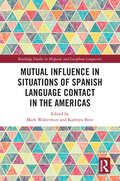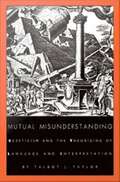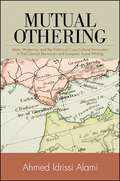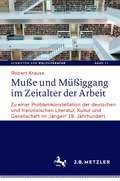- Table View
- List View
Muslim Women of the Fergana Valley: A 19th-Century Ethnography from Central Asia
by Mariana Markova Maria Nalivkina Marianne Kamp Vladimir NalivkinMuslim Women of the Fergana Valley is the first English translation of an important 19th-century Russian text describing everyday life in Uzbek communities. Vladimir and Maria Nalivkin were Russians who settled in a "Sart" village in 1878, in a territory newly conquered by the Russian Empire. During their six years in Nanay, Maria Nalivkina learned the local language, befriended her neighbors, and wrote observations about their lives from birth to death. Together, Maria and Vladimir published this account, which met with great acclaim from Russia's Imperial Geographic Society and among Orientalists internationally. While they recognized that Islam shaped social attitudes, the Nalivkins never relied on common stereotypes about the "plight" of Muslim women. The Fergana Valley women of their ethnographic portrait emerge as lively, hard-working, clever, and able to navigate the cultural challenges of early Russian colonialism. Rich with social and cultural detail of a sort not available in other kinds of historical sources, this work offers rare insight into life in rural Central Asia and serves as an instructive example of the genre of ethnographic writing that was emerging at the time. Annotations by the translators and an editor's introduction by Marianne Kamp help contemporary readers understand the Nalivkins' work in context.
Muslim Women’s Writing from across South and Southeast Asia
by Feroza JussawallaThis essential collection examines South and Southeast Asian Muslim women’s writing and the ways they navigate cultural, political, and controversial boundaries. Providing a global, contemporary collection of essays, this volume uses varied methods of analysis and methodology, including: • Contemporary forms of expression, such as memoir, oral accounts, romance novels, poetry, and social media; • Inclusion of both recognized and lesser-known Muslim authors; • Division by theme to shed light on geographical and transnational concerns; and • Regional focus on Afghanistan, Pakistan, India, Bangladesh, Sri Lanka, Malaysia, and Indonesia. Muslim Women’s Writing from across South and Southeast Asia will deliver crucial scholarship for all readers interested in the varied perspectives and comparisons of Southern Asian writing, enabling both students and scholars alike to become better acquainted with the burgeoning field of Muslim women's writing. This timely and challenging volume aims to give voice to the creative women who are frequently overlooked and unheard.
Muslim and Christian Understanding
by Waleed El-Ansary David K. LinnanThis book explores 'A Common Word Between Us and You', a high-level ongoing Christian-Muslim dialogue process. The Common Word process was commenced by leading Islamic scholars and intellectuals as outreach in response to the Pope's much criticized Regensburg address of 2007.
Muslim and Supermuslim: The Quest for the Perfect Being and Beyond (Palgrave Studies in the Future of Humanity and its Successors)
by Roy JacksonThis book looks to the rich and varied Islamic tradition for insights into what it means to be human and, by implication, what this can tell us about the future human. The transhumanist movement, in its more radical expression, sees Homo sapiens as the cousin, perhaps the poorer cousin, of a new Humanity 2.0: ‘Man’ is replaced by ‘Superman’. The contribution that Islam can make to this movement concerns the central question of what this ‘Superman’ – or ‘Supermuslim’ – would actually entail. To look at what Islam can contribute we need not restrict ourselves to the Qur’an and the legal tradition, but also reach out to its philosophical and literary corpus. Roy Jackson focuses on such contributions from Muslim philosophy, science, and literature to see how Islam can confront and respond to the challenges raised by the growing movement of transhumanism.
Muslims and Jews in America
by Reza Aslan Aaron J. Hahn TapperThis book is an exploration of contemporary Jewish-Muslim relations in the United States and the distinct ways in which these two communities interact with one another in the American context. Each essay discusses a different episode from the recent twentieth and current twenty-first century American milieu that links these two groups together.
Muslims in the Bulgarian and the British Press: The Multifarious Image of the Religious Other
by Desislava Cheshmedzhieva-StoychevaThis book compares the ways in which the national media in two different countries construct (frame) and develop the image of the religious other, in this case Muslims in all their variety. Although it introduces concepts such as race and racism, otherness, Orientalism and Islamophobia, which may be familiar to the majority of readers, in this manuscript they serve the purpose of a comparative analysis which has not been done on the subject to date. The manuscript analyzes the thematic distribution of the articles, as well as the definitions, metaphors and stereotypes used, thus presenting a complete and diverse image of Muslims along with the similarities and differences in the thinking patterns employed by Bulgarians and British on the subject and expressed in the respective mainstream media. In this respect the manuscript fills a void in the scholarly literature on the ways the media discourses in two very different countries present the image of a religious group. Here we can even talk about the existing divide between East and West and the changing perception of the religious Other fostered by the general digitalization and free flow of information. As English is an international language it undeniably makes access to information easier, however, there are not many culture specific studies presenting the current state of a problem or the analyses on that particular topic (the image of Muslims) in that international medium. Therefore, the manuscript aims at introducing English speaking scholars, students, media people, and generally everyone interested in the topic, to the Bulgarian way of seeing, depicting and talking about Muslims. As stated above, the manuscript draws parallels between the language used by the Bulgarian and the British media, thus providing a similar starting point as the majority of the potential readers are probably more familiar with the latter. In addition, scholars working extensively with other local cultures and/or media and resorting to English as a medium for the popularization of their research, can use the presented analytical frame to their specific analyses and contribute even further to the enrichment of the global data base on the topic.
Mussolini's Decennale
by Antonio MorenaThe year 1932, the tenth anniversary of Mussolini's March on Rome, was fascism's Decennale. Commemorating Italian fascism's seizure of power, the Decennale was celebrated by the regime in a deliberate attempt to radicalize the original movement and develop it into an imperial and racist regime.In Mussolini's Decennale, Antonio Morena explores a cross-section of Italian culture during the Decennale. Studying literature, speeches, documentaries, films, textbooks, and the 1932 Exhibition, he discusses how the regime, its patrons, and even its critics all appropriated the historical events of 1922 for their political advantage. Positioning the 1932 anniversary celebrations as the crux of the fascist transition from conservatism to totalitarianism, Mussolini's Decennale broadens our understanding of fascist ideology, cultural politics, and Realpolitik.
Must We Divide History Into Periods? (European Perspectives: A Series in Social Thought and Cultural Criticism)
by Jacques Le GoffWe have long thought of the Renaissance as a luminous era that marked a decisive break with the past, but the idea of the Renaissance as a distinct period arose only during the nineteenth century. Though the view of the Middle Ages as a dark age of unreason has softened somewhat, we still locate the advent of modern rationality in the Italian thought and culture of the fifteenth and sixteenth centuries. Jacques Le Goff pleads for a strikingly different view. In this, his last book, he argues persuasively that many of the innovations we associate with the Renaissance have medieval roots, and that many of the most deplorable aspects of medieval society continued to flourish during the Renaissance. We should instead view Western civilization as undergoing several "renaissances" following the fall of Rome, over the course of a long Middle Ages that lasted until the mid-eighteenth century. While it is indeed necessary to divide history into periods, Le Goff maintains, the meaningful continuities of human development only become clear when historians adopt a long perspective. Genuine revolutions—the shifts that signal the end of one period and the beginning of the next—are much rarer than we think.
Must We Kill the Thing We Love?: Emersonian Perfectionism and the Films of Alfred Hitchcock (Film and Culture Series)
by William RothmanWilliam Rothman argues that the driving force of Hitchcock's work was his struggle to reconcile the dark vision of his favorite Oscar Wilde quote, "Each man kills the thing he loves," with the quintessentially American philosophy, articulated in Emerson's writings, that gave classical Hollywood movies of the New Deal era their extraordinary combination of popularity and artistic seriousness. A Hitchcock thriller could be a comedy of remarriage or a melodrama of an unknown woman, both Emersonian genres, except for the murderous villain and godlike author, Hitchcock, who pulls the villain's strings—and ours. Because Hitchcock believed that the camera has a murderous aspect, the question "What if anything justifies killing?," which every Hitchcock film engages, was for him a disturbing question about his own art. Tracing the trajectory of Hitchcock's career, Rothman discerns a progression in the films' meditations on murder and artistic creation. This progression culminates in Marnie (1964), Hitchcock's most controversial film, in which Hitchcock overcame his ambivalence and fully embraced the Emersonian worldview he had always also resisted.Reading key Emerson passages with the degree of attention he accords to Hitchcock sequences, Rothman discovers surprising affinities between Hitchcock's way of thinking cinematically and the philosophical way of thinking Emerson's essays exemplify. He finds that the terms in which Emerson thought about reality, about our "flux of moods," about what it is within us that never changes, about freedom, about America, about reading, about writing, and about thinking are remarkably pertinent to our experience of films and to thinking and writing about them. He also reflects on the implications of this discovery, not only for Hitchcock scholarship but also for film criticism in general.
Mutant Neoliberalism: Market Rule and Political Rupture
by William Callison and Zachary ManfrediTales of neoliberalism’s death are serially overstated. Following the financial crisis of 2008, neoliberalism was proclaimed a “zombie,” a disgraced ideology that staggered on like an undead monster. After the political ruptures of 2016, commentators were quick to announce “the end” of neoliberalism yet again, pointing to both the global rise of far-right forces and the reinvigoration of democratic socialist politics. But do new political forces sound neoliberalism’s death knell or will they instead catalyze new mutations in its dynamic development?Mutant Neoliberalism brings together leading scholars of neoliberalism—political theorists, historians, philosophers, anthropologists and sociologists—to rethink transformations in market rule and their relation to ongoing political ruptures. The chapters show how years of neoliberal governance, policy, and depoliticization created the conditions for thriving reactionary forces, while also reflecting on whether recent trends will challenge, reconfigure, or extend neoliberalism’s reach. The contributors reconsider neoliberalism’s relationship with its assumed adversaries and map mutations in financialized capitalism and governance across time and space—from Europe and the United States to China and India. Taken together, the volume recasts the stakes of contemporary debate and reorients critique and resistance within a rapidly changing landscape.Contributors: Étienne Balibar, Sören Brandes, Wendy Brown, Melinda Cooper, Julia Elyachar, Michel Feher, Megan Moodie, Christopher Newfield, Dieter Plehwe, Lisa Rofel, Leslie Salzinger, Quinn Slobodian
Mutants & Mystics: Science Fiction, Superhero Comics, and the Paranormal
by Jeffrey J. KripalIn many ways, twentieth-century America was the land of superheroes and science fiction. From Superman and Batman to the Fantastic Four and the X-Men, these pop-culture juggernauts, with their "powers and abilities far beyond those of mortal men," thrilled readers and audiences—and simultaneously embodied a host of our dreams and fears about modern life and the onrushing future. But that's just scratching the surface, says Jeffrey Kripal. In Mutants and Mystics, Kripal offers a brilliantly insightful account of how comic book heroes have helped their creators and fans alike explore and express a wealth of paranormal experiences ignored by mainstream science. Delving deeply into the work of major figures in the field—from Jack Kirby’s cosmic superhero sagas and Philip K. Dick’s futuristic head-trips to Alan Moore’s sex magic and Whitley Strieber’s communion with visitors—Kripal shows how creators turned to science fiction to convey the reality of the inexplicable and the paranormal they experienced in their lives. Expanded consciousness found its language in the metaphors of sci-fi—incredible powers, unprecedented mutations, time-loops and vast intergalactic intelligences—and the deeper influences of mythology and religion that these in turn drew from; the wildly creative work that followed caught the imaginations of millions. Moving deftly from Cold War science and Fredric Wertham's anticomics crusade to gnostic revelation and alien abduction, Kripal spins out a hidden history of American culture, rich with mythical themes and shot through with an awareness that there are other realities far beyond our everyday understanding. A bravura performance, beautifully illustrated in full color throughout and brimming over with incredible personal stories, Mutants and Mystics is that rarest of things: a book that is guaranteed to broaden—and maybe even blow—your mind.
Mutants and Mystics: Science Fiction, Superhero Comics, and the Paranormal
by Jeffrey J. KripalIn many ways, twentieth-century America was the land of superheroes and science fiction. From Superman and Batman to the Fantastic Four and the X-Men, these pop-culture juggernauts, with their "powers and abilities far beyond those of mortal men," thrilled readers and audiences--and simultaneously embodied a host of our dreams and fears about modern life and the onrushing future. But that's just scratching the surface, says Jeffrey Kripal. In Mutants and Mystics, Kripal offers a brilliantly insightful account of how comic book heroes have helped their creators and fans alike explore and express a wealth of paranormal experiences ignored by mainstream science. Delving deeply into the work of major figures in the field--from Jack Kirby's cosmic superhero sagas and Philip K. Dick's futuristic head-trips to Alan Moore's sex magic and Whitley Strieber's communion with visitors--Kripal shows how creators turned to science fiction to convey the reality of the inexplicable and the paranormal they experienced in their lives. Expanded consciousness found its language in the metaphors of sci-fi--incredible powers, unprecedented mutations, time-loops and vast intergalactic intelligences--and the deeper influences of mythology and religion that these in turn drew from; the wildly creative work that followed caught the imaginations of millions. Moving deftly from Cold War science and Fredric Wertham's anticomics crusade to gnostic revelation and alien abduction, Kripal spins out a hidden history of American culture, rich with mythical themes and shot through with an awareness that there are other realities far beyond our everyday understanding. A bravura performance, beautifully illustrated in full color throughout and brimming over with incredible personal stories, Mutants and Mystics is that rarest of things: a book that is guaranteed to broaden--and maybe even blow--your mind.
Mutants, Androids, and Aliens: On Being Human in the Marvel Cinematic Universe
by James A. TynerIn both literature and film, mutants, androids, and aliens have long functioned as humanity’s Other—nonhuman bodies serving as surrogates to explore humanity’s prejudice, bigotry, and hatred. Scholars working in fields of feminism, ethnic studies, queer studies, and disability studies, among others, have deconstructed representations of the Othered body and the ways these fictional depictions provide insight into the contested terrains of identity, subjectivity, and personhood. In science fiction more broadly and the superhero genre in particular, the fictional Other—often a superhero or a villain—is juxtaposed against the normal human, and such Others have long been the subject of academic investigation. Author James A. Tyner shifts this scholarly focus to consider the ordinary humans who ally with or oppose Othered superheroes. Law enforcement officers, military officials, politicians, and the countless, nameless civilians are all examples of humans who try to make sense of a rapidly changing more-than-human and other-than-human universe. The resulting volume, Mutants, Androids, and Aliens: On Being Human in the Marvel Cinematic Universe, provides a critical posthumanist reading of being human in the Marvel Cinematic Universe (MCU). Centering the MCU’s secondary human characters, including Matthew Ellis, Ellen Nadeer, Rosalind Price, as well as Jimmy Woo, Sadie Deever, Holden Radcliffe, and others, Tyner considers how these characters attempt to monitor, incarcerate, or exterminate those beings considered "unnatural" and thus threatening. Placing into conversation posthumanism, environmental ethics, and myriad philosophical and biological ontologies of life and death, Tyner maintains that the superhero genre reflects the current complexities of meaningful life—and of what happens in society when "the human" is no longer the unquestioned normative standard.
Mutation in Welsh
by Martin J. Ball Nicole MüllerFirst published in 2002. Routledge is an imprint of Taylor & Francis, an informa company.
Mute Dreams, Blind Owls, and Dispersed Knowledges: Persian Poesis in the Transnational Circuitry
by Michael M. J. FischerOver the past decade Iranian films have received enormous international attention, garnering both critical praise and popular success. Combining his extensive ethnographic experience in Iran and his broad command of critical theory, Michael M. J. Fischer argues that the widespread appeal of Iranian cinema is based in a poetics that speaks not only to Iran's domestic cultural politics but also to the more general ethical dilemmas of a world simultaneously torn apart and pushed together. Approaching film as a tool for anthropological analysis, he illuminates how Iranian filmmakers have incorporated and remade the rich traditions of oral, literary, and visual media in Persian culture. Fischer reveals how the distinctive expressive idiom emerging in contemporary Iranian film reworks Persian imagery that has itself been in dialogue with other cultures since the time of Zoroaster and ancient Greece. He examines a range of narrative influences on this expressive idiom and imagery, including Zoroastrian ritual as it is practiced in Iran, North America, and India; the mythic stories, moral lessons, and historical figures written about in Iran's national epic, the Shahnameh; the dreamlike allegorical world of Persian surrealism exemplified in Sadeq Hedayat's 1939 novella The Blind Owl; and the politically charged films of the 1960s and 1970s. Fischer contends that by combining Persian traditions with cosmopolitan influences, contemporary Iranian filmmakers--many of whom studied in Europe and America--provide audiences around the world with new modes of accessing ethical and political experiences.
Mute Poetry, Speaking Pictures (Essays in the Arts)
by Leonard BarkanThe skirmish between painting and poetry—from Plato and Praxiteles to Rembrandt and ShakespeareWhy do painters sometimes wish they were poets—and why do poets sometimes wish they were painters? What happens when Rembrandt spells out Hebrew in the sky or Poussin spells out Latin on a tombstone? What happens when Virgil, Ovid, or Shakespeare suspend their plots to describe a fictitious painting? In Mute Poetry, Speaking Pictures, Leonard Barkan explores such questions as he examines the deliciously ambiguous history of the relationship between words and pictures, focusing on the period from antiquity to the Renaissance but offering insights that also have much to say about modern art and literature.The idea that a poem is like a picture has been a commonplace since at least ancient Greece, and writers and artists have frequently discussed poetry by discussing painting, and vice versa, but their efforts raise more questions than they answer. From Plutarch ("painting is mute poetry, poetry a speaking picture") to Horace ("as a picture, so a poem"), apparent clarity quickly leads to confusion about, for example, what qualities of pictures are being urged upon poets or how pictorial properties can be converted into poetical ones.The history of comparing and contrasting painting and poetry turns out to be partly a story of attempts to promote one medium at the expense of the other. At the same time, analogies between word and image have enabled writers and painters to think about and practice their craft. Ultimately, Barkan argues, this dialogue is an expression of desire: the painter longs for the rich signification of language while the poet yearns for the direct sensuousness of painting.
Mute Speech: Literature, Critical Theory, and Politics (New Directions in Critical Theory)
by Jacques RancièreJacques Rancière has continually unsettled political discourse, particularly through his questioning of aesthetic "distributions of the sensible," which configure the limits of what can be seen and said. Widely recognized as a seminal work in Rancière's corpus, the translation of which is long overdue, Mute Speech is an intellectual tour de force proposing a new framework for thinking about the history of art and literature. Rancière argues that our current notion of "literature" is a relatively recent creation, having first appeared in the wake of the French Revolution and with the rise of Romanticism. In its rejection of the system of representational hierarchies that had constituted belles-letters, "literature" is founded upon a radical equivalence in which all things are possible expressions of the life of a people. With an analysis reaching back to Plato, Aristotle, the German Romantics, Vico, and Cervantes and concluding with brilliant readings of Flaubert, Mallarmé, and Proust, Rancière demonstrates the uncontrollable democratic impulse lying at the heart of literature's still-vital capacity for reinvention.
Muting Israeli Democracy: How Media and Cultural Policy Undermine Free Expression
by Amit M. SchejterThe result of years of critical analysis of Israeli media law, this book argues that the laws governing Israeli electronic media are structured to limit the boundaries of public discourse. Amit M. Schejter posits the theory of a "mute democracy," one in which the media are designed to provide a platform for some voices to be heard over others. While Israel's institutions may be democratic, and while the effect of these policies may be limited, this book contends that free speech in Israel is institutionally muted to ensure the continued domination of the Jewish majority and its preferred interpretation of what Israel means as a Jewish-democratic state. Analyzing a wide range of legal documents recorded in Israel from 1961 to 2007, Muting Israeli Democracy demonstrates in scrupulous detail how law and policy are used to promote the hegemonic national culture through the constraints and obligations set on electronic media.
Mutual Flame - Wilson Knight V: On Shakespeare's Sonnets And The Phoenix And The Turtle
by Wilson KnightFirst Published in 2002. Routledge is an imprint of Taylor & Francis, an informa company.
Mutual Impact: At the Crossroads of Psychoanalysis and Literature
by Joachim KuchenhoffWhat can psychoanalysis contribute to the interpretation and understanding of cultural products, in particular, literary works? What, on the other hand, can novels and plays offer to widen the conceptual and theoretical perspectives in psychology and psychoanalysis? The interpretative strategies offered by psychoanalysis, often unfamiliar to cultural studies, can adorn literature with new meaning. Psychoanalysis enables the perspective of unconscious motivations of social action and thought and widens semiotic strategies to understand linguistic, and even infra-linguistic, signs. Conversely, psychoanalytic thinking has since its advent greatly profited from literature and literary criticism. From Freud onwards, psychoanalytic theory has integrated poetic knowledge or transformed epistemological and interpretative concepts of cultural studies into psychoanalysis. Nine chapters each cover a famous work of literature from the likes of William Shakespeare and Herman Melville. Joachim Kuchenhoff interprets each work from a psychoanalytic perspective while simultaneously combing its content for lessons which can be drawn and utilised in psychoanalytic practice, thereby eliciting the symbiotic relationship between the two fields. Covering topics ranging from the tolerance for loss and the negative in King Lear to the difficulties in mourning and beginning anew in Nathan Hill's The Nix, this intriguing work is a must-read for all those with an interest in literature, as well as those in the psychoanalytic field who wish to expand their knowledge base and adopt new and different ways of thinking.
Mutual Impressions: Writers from the Americas Reading One Another
by Ilan StavansIt is commonly assumed that the United States and Latin America, culturally so different, move artistically to very different rhythms. Also common is the assumption that, with rare exception, the literary figures on one side of the global North/South divide have had little interest in the work of their counterparts. With Mutual Impressions Ilan Stavans dispels these notions by showing how solid the bridges between writers and across borders have been, at least since the early days of this century, and how crucial they are likely to become as we enter the next millennium. Divided into symmetrical halves--South reading North and North reading South--the book presents essays by leading novelists, poets, and other writers that focus on the work of another literary figure from across the divide. Borges, for example, finds in Hawthorne the perfect precursor to his own interest in allegories; Katherine Anne Porter examines José Joaquín Fernández de Lizardi as a rascal whose picaresque views of life in The Itching Parrot served to launch the Latin American novel; Cortázar's study of the plots and style of Poe shows an affinity that left an indelible mark on the Argentine's short fiction; Susan Sontag views Machado de Assis as the ultimate mirror, a proto-postmodernist. With other essays by Thomas Pynchon, William H. Gass, John Updike, Gabriel García Márquez, Alejo Carpentier, John Barth, Robert Coover, Pedro Henríquez Ureña, Grace Paley, Juan Carlos Onetti, and Mark Strand, among others, Mutual Impressions offers a remarkable view of the connections that comprise a literary tradition of the Americas. It is a book that will surprise and enliven its readers as it informs and awakens in them a sense of wonder.Contributors. John Barth, José Bianco, Robert Bly, Jorge Luis Borges, Alejo Carpentier, Hiber Conteris, Robert Coover, Julio Cortázar, Ezequiel Martínez Estrada, Waldo Frank, Carlos Fuentes, William H. Gass, Nicolás Guillén, William Kennedy, Mario Vargas Llosa, Gabriel García Márquez, José Martí, Pablo Neruda, Victoria Ocampo, Juan Carlos Onetti, Grace Paley, Octavio Paz, Katherine Anne Porter, Thomas Pynchon, Kenneth Rexroth, Antonio Benítez Rojo, Barbara Probst Solomon, Susan Sontag, Ilan Stavans, Mark Strand, John Updike, Pedro Henríque Ureña, Derek Walcott, Paul West
Mutual Influence in Situations of Spanish Language Contact in the Americas (Routledge Studies in Hispanic and Lusophone Linguistics)
by Mark Waltermire and Kathryn BoveMutual Influence in Situations of Spanish Language Contact in the Americas focuses on the structural results of contact between Spanish and Maya, Quechua, Guaraní, Portuguese, and English in the Americas. This edited volume explores the various ways in which these languages affect the linguistic structure of Spanish in situations of language contact, and also how Spanish impacts their linguistic structure. Across ten chapters, this book offers a broad survey of bidirectional influence in Spanish contact situations both geographically (in the US Southwest, the Yucatán Peninsula, the Andean regions of Ecuador and Peru, and the Southern Cone) and structurally (in the areas of phonetics, phonology, morphosyntax, semantics, and pragmatics). By examining the potential structural effects that two languages have on one another, it provides a novel and more holistic perspective on mutual linguistic influence than that of previous work on language contact. The volume serves as a reference on mutual influence in bilingual language varieties and will be of interest to researchers, scholars and graduate students in Hispanic linguistics, and more broadly in language contact.
Mutual Misunderstanding: Scepticism and the Theorizing of Language and Interpretation
by Talbot J. TaylorDo others understand what we say or write? Do we understand them? Theorists of language and interpretation claim to be more concerned with questions about "what" we understand and "how" we understand, rather than with the logically prior question "whether" we understand each other. An affirmative answer to the latter question is apparently taken for granted. However, in Mutual Misunderstanding, Talbot J. Taylor shows that the sceptical doubts about communicational understanding do in fact have a profoundly important, if as yet unacknowledged, function in the construction of theories of language and interpretation. Mutual Misundertanding thus presents a strikingly original analysis of the rhetorical patterns underlying Western linguistic thought, as exemplified in the works of John Locke, Jacques Derrida, Gottlob Frege, Jonathan Culler, Noam Chomsky, Ferdinand de Saussure, H. Paul Grice, Michael Dummet, Stanley Fish, Alfred Schutz, Barbara Herrnstein Smith, Harold Garfinkel, and others. This analysis reveals how, by the combined effect of appeals to "commonsense" and anxieties about implications of relativism, scepticism has a determining role in the discursive development of a number of the intellectual disciplines making up the "human sciences" today, including critical theory, literary hermeneutics, philosophy of language and logic, communication theory, discourse and conversation analysis, pragmatics, stylistics, and linguistics. Consequently, this provocative study will be of value to readers from a wide variety of disciplinary backgrounds.
Mutual Othering: Islam, Modernity, and the Politics of Cross-Cultural Encounters in Pre-Colonial Moroccan and European Travel Writing
by Ahmed Idrissi AlamiFor the first time, readings of Moroccan travel writing in Arabic are juxtaposed with French and British writing about Morocco in a critical exploration of nineteenth-century concepts of modernity. Ahmed Idrissi Alami investigates the complex dynamics concerning colonial expansion, military conflict, and societal values. Mutual Othering sets out to rethink generally accepted concepts of European modernity by critically examining its production and contestation within a subaltern context in which the native other—in this case, religious scholars or imams accompanying political missions to Paris and London—presents aspects of European culture to elite members of the Moroccan imperial court. This work also connects the arguments of these texts to the rethinking of tradition and modernity, the rhetoric of reform, democracy and the Arab state, and the compatibility of Islam with the West and secular values in the post-9/11 world. The inclusion of citations in the original French and Arabic, alongside English translations, allows a range of readers to enjoy this critical addition to the fields of literature, travel writing, North African studies, history, international relations, and philosophy, as well as cultural and religious studies.
Muße und Müßiggang im Zeitalter der Arbeit: Zu einer Problemkonstellation der deutschen und französischen Literatur, Kultur und Gesellschaft im ‚langen‘ 19. Jahrhundert (Schriften zur Weltliteratur/Studies on World Literature #11)
by Robert KrauseDie Geschichte der Moderne wurde oft als eine Geschichte der modernen Arbeitswelt – im Sinne der Ausdifferenzierung, Ökonomisierung, Professionalisierung und Beschleunigung – erzählt. Sie ist aber auch eine Geschichte neuer Formen der ‚Muße‘ und des ‚Müßiggangs‘, die ebenso einen Teil dessen bilden, was wir heute ‚modern‘ nennen. Mit dem spannungsreichen Verhältnis von Arbeit, Muße und Müßiggang in der Moderne beschäftigt sich die vorliegende komparatistische Studie; sie bietet Einblicke in Konzepte, Diskurse und Figurationen der Muße und des Müßiggangs in der modernen deutschen und französischen Literatur, Kultur und Philosophie und unterzieht den schillernden Begriff der Moderne selbst einer fundamentalen Revision.
